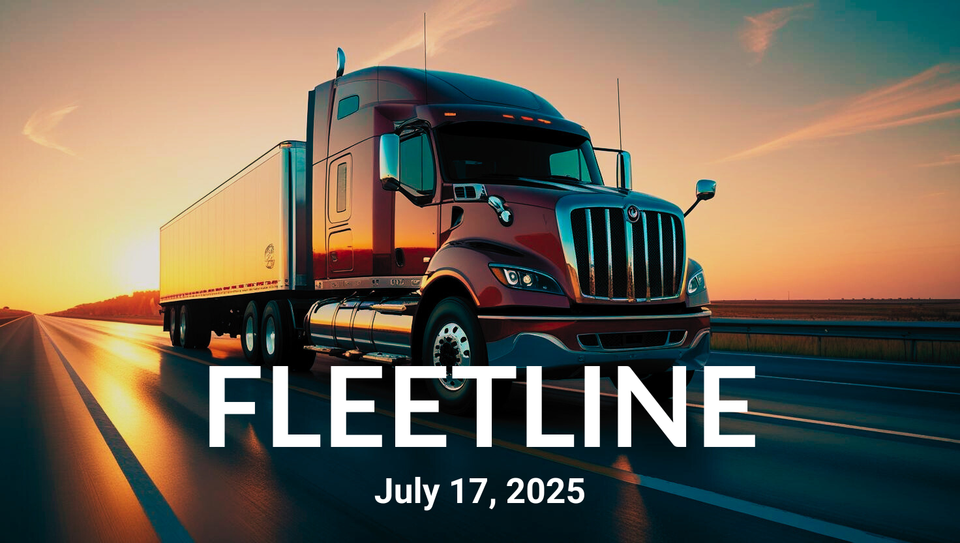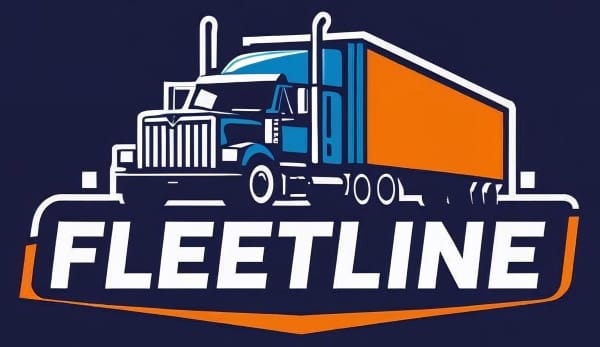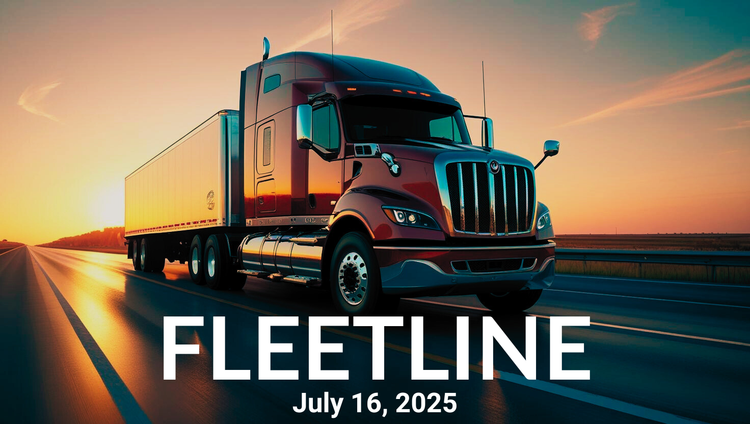🚛 Fleetline • July 17, 2025

From labor gridlock to charging breakthroughs, today's Fleetline breaks down the wins, warnings, and wrench-turning realities across trucking.
🔦 OEM Spotlight
🧰 International Launches Bold Fleetrite Warranty
International Motors (formerly Navistar) just gave its parts division a major credibility boost. The new Fleetrite All-Makes warranty now covers 18 months—6 months longer than most competitors. With over 100 part categories in its catalog, this makes Fleetrite even more attractive for cost-conscious operators looking to cut downtime and maintain warranty protection outside of OEM-branded parts.
🔗 Read More
💰 GM Doubles Down on ICE Trucks
While everyone’s talking EVs, GM is dropping $4 billion into its internal combustion engine (ICE) truck and SUV production. Why? Because demand for full-size pickups and work trucks is still hot—especially among contractors and rural fleets. Think of it as a reminder: the electric future isn’t a straight road.
🔗 Read More
⚙️ Fleet Tech Brief
🔋 WattEV Triples Megawatt Charging Capacity
WattEV just announced plans to build three new megawatt charging depots for electric trucks. These ultra-fast chargers will cut EV charging times dramatically and make long-haul electrification a lot more practical. It’s like swapping a coffee break for a full tank.
🔗 Read More
📡 Telematics Investment Surges in Ag Sector
Farm fleets and agribusinesses are pouring money into smart tracking systems. From fuel management to predictive maintenance, ag haulers are now embracing telematics to fight labor shortages and weather-related delays.
🔗 Read More
🏪 Dealer Dashboard
The trucking industry’s most persistent pain point is revving back into focus—and no, it's not diesel prices or emissions. It's people. Or more accurately, the lack of them.
A new American Transportation Research Institute (ATRI) study finds that labor shortages, particularly for technicians and diesel mechanics, are worsening again after a temporary lull in 2023. While driver shortages often steal the spotlight, the technician gap may be even more disruptive, especially for OEM-affiliated dealers and independent service networks trying to keep uptime promises.
💥 Where It Hurts
Dealerships and fleet service centers are reporting longer service backlogs due to reduced technician availability, with some shops scheduling PMs and minor repairs up to 2–3 weeks out. This bottleneck is creating frustration for fleets running tighter margins and leaner equipment cycles. Trucks may be more technologically advanced than ever—but without trained hands turning wrenches, they’re just expensive parking lot ornaments.
For dealers, that’s not just a service issue—it’s a customer retention threat.
OEMs like Volvo, Freightliner, and International Motors have pushed hard in recent years to modernize their technician training programs, but the pipeline still isn’t keeping up with attrition. The average diesel tech today is over 40 years old, and many are exiting faster than they’re being replaced.
🎓 Training the Next Generation
While dealerships and OEMs are investing in apprenticeship programs, community college partnerships, and “tech of tomorrow” campaigns, recruiting young talent into the trades remains a tough sell—especially with vocational careers battling image issues in the age of TikTok influencers and remote coding bootcamps.
Some dealer groups are getting creative:
- Sign-on bonuses north of $5,000
- Tool reimbursement programs to offset upfront costs
- Flexible scheduling for night-shift and weekend techs
- And yes, even TikTok videos of techs at work to attract Gen Z.
Still, it’s not just about getting them in the door—it’s about keeping them. Retention is also proving tough due to rising workload demands, flat career mobility in some shops, and competing offers from municipal transit agencies or construction firms.
🔄 What This Means for Dealers
The labor crunch has a direct impact on service revenue, customer satisfaction, and even truck sales. Why? Because many fleets won’t commit to buying more trucks if they can’t maintain the ones they already have.
As one dealer put it:
“The best spec sheet in the world means nothing if you can’t guarantee a bay when that truck breaks down.”
Expect to see continued investment in remote diagnostics, mobile maintenance fleets, and predictive analytics to reduce pressure on human techs—but make no mistake, solving the labor shortage will require more boots on the shop floor.
🔗 Read More
🧪 Regulatory Radar
🌎 CARB Regs Could Reshape the Market
California’s Air Resources Board (CARB) continues to lead the charge with new rules targeting diesel fleets and pushing electrification mandates faster than federal standards. For now, these regs hit trucks operating in CA—but many manufacturers are updating their national strategies to avoid split compliance. Translation: if California sneezes, your next truck might need an EV cough drop.
🔗 Read More
🏛️ ATA Pushes for Infrastructure Spending
The American Trucking Associations is supporting a new $200M House bill focused on freight corridors, rest stop upgrades, and bridge repairs. The lobbying push comes just as peak shipping season begins—timing that’s more strategic than accidental.
🔗 Read More
🧭 Backhaul Bits
🔌 GM + Tesla = Charging Peace
GM’s electric trucks will get access to Tesla’s Supercharger network starting this year. It’s a major win for EV adopters who’ve struggled with limited charging infrastructure.
🔗 Read More
📉 Used Truck Sales Dip Slightly
Class 8 used truck transactions slipped 4% last month, but pricing remains steady. Fleets are pausing new buys until Q4 forecasts solidify.
🔗 Read More
💡 ATA Supports Autonomous Truck Research
The ATA has thrown support behind a federal bill funding autonomous freight corridor studies. While driverless rigs aren’t ready for primetime, the research could shape future licensing and insurance standards.
🔗 Read More
🛠️ OEMs Face Parts Pressure
OEM service centers are seeing rising parts lead times, driven by supplier backlogs in Asia. Dealers are adjusting stock levels and leaning on all-makes alternatives.
🔗 Read More
☕ Final Take
From GM’s ICE loyalty to WattEV’s charging leap, it’s clear this industry isn’t all-in on electrification just yet—but it’s definitely plugging in. Labor issues linger, CARB keeps the pressure on, and dealers are watching both infrastructure bills and invoice lead times.


